Bloomington adopts “Safe Streets” plan, now ready for 2025 federal funding application round
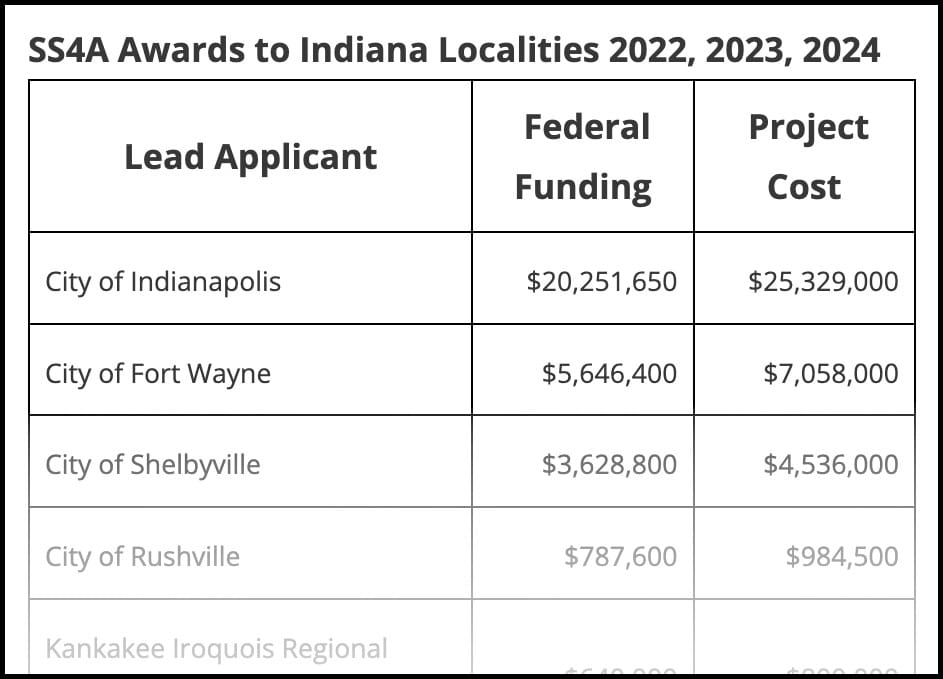
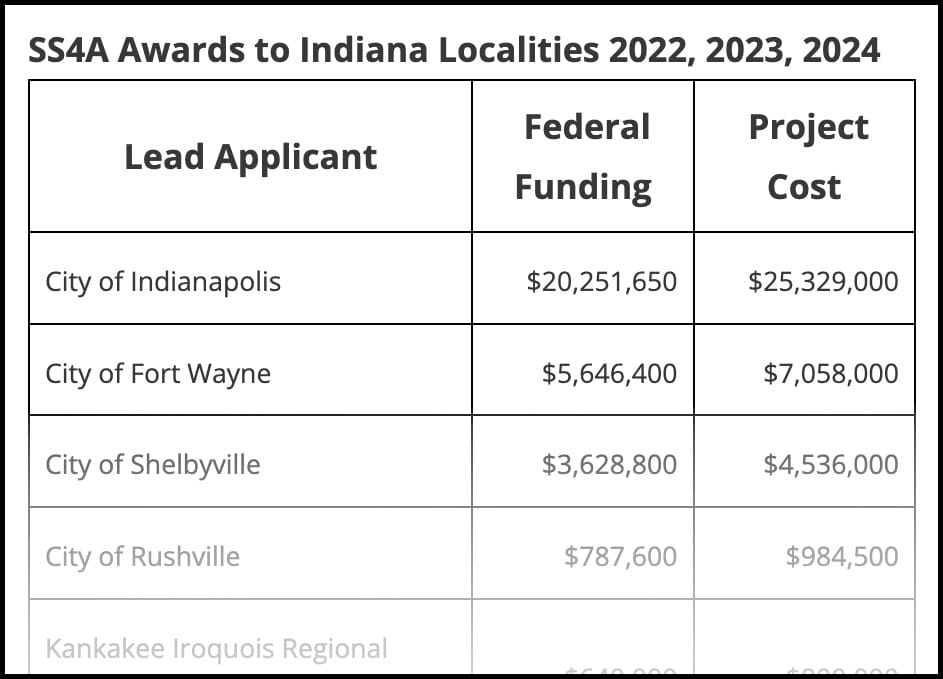
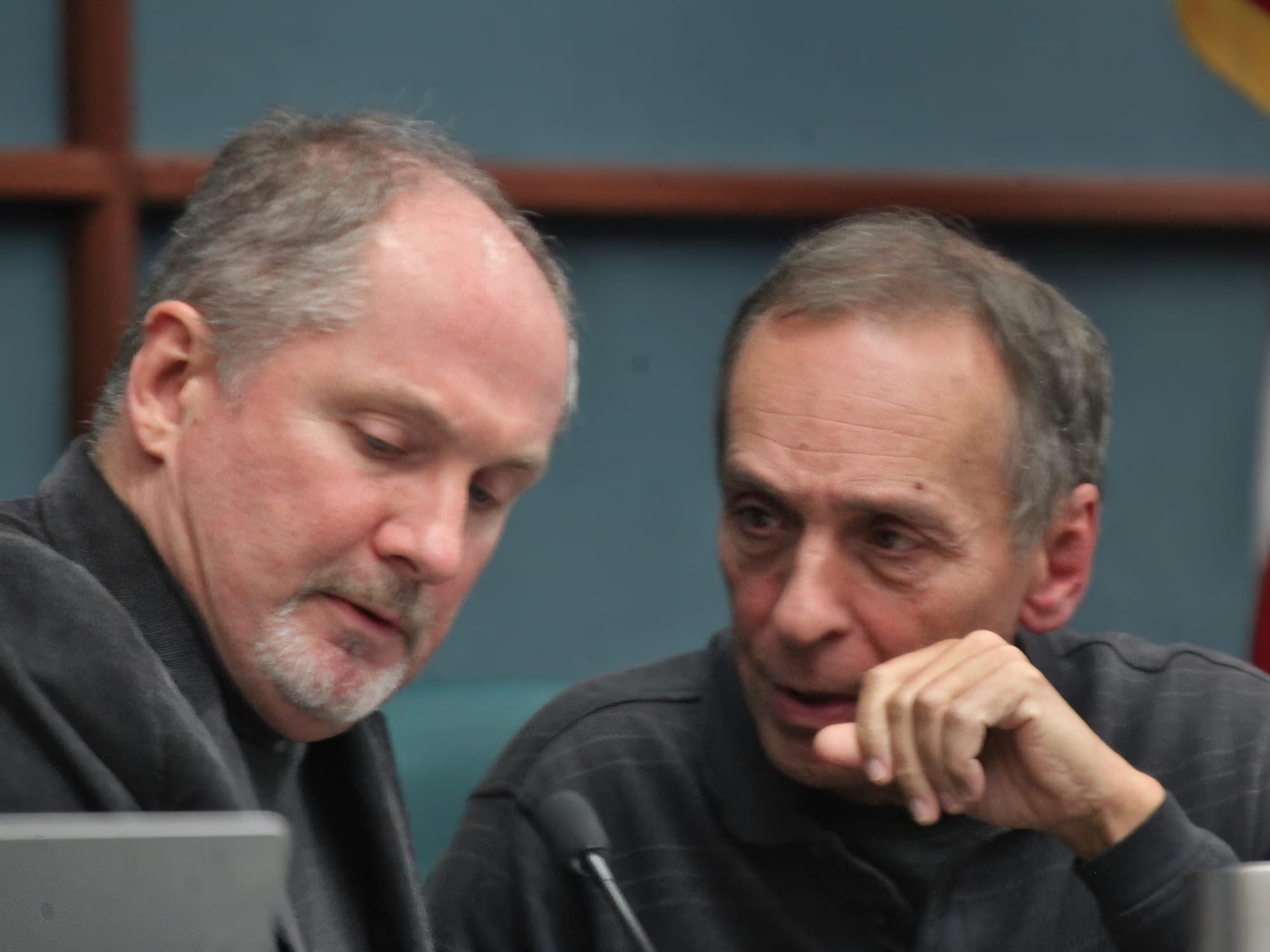
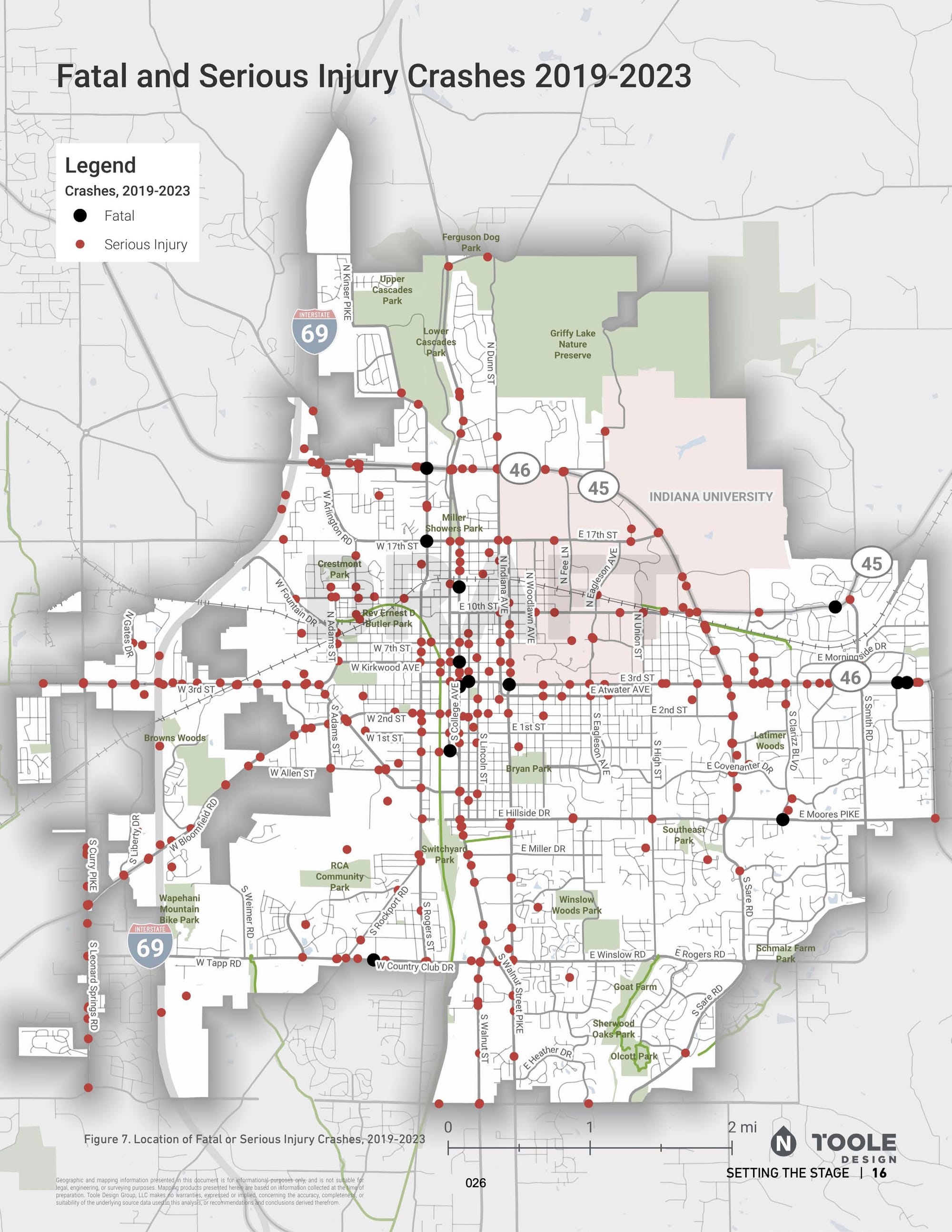
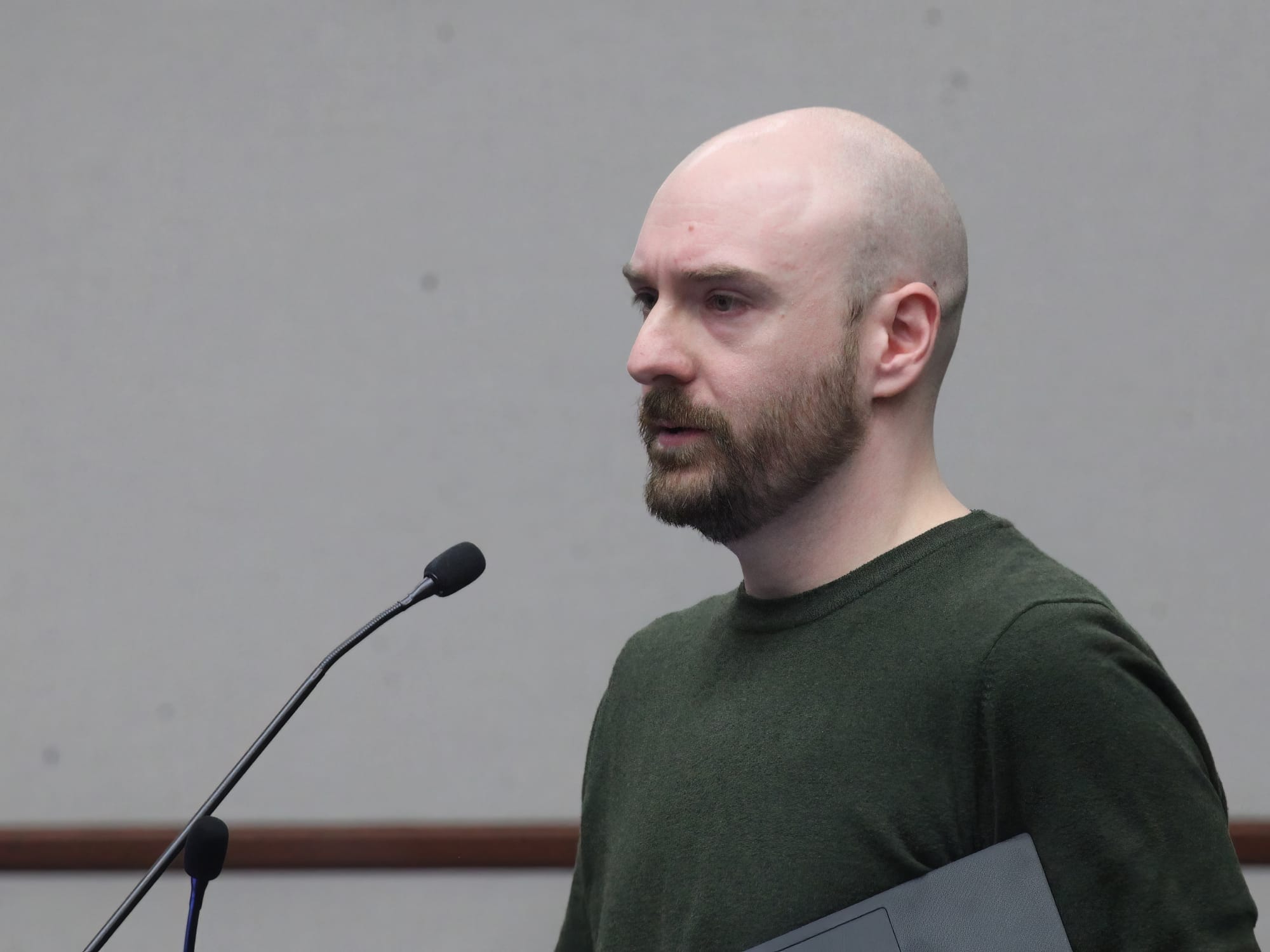
On a unanimous vote, Bloomington’s city council has adopted a “Safe Streets for All” (SS4A) action plan.
The plan is supposed to guide the city’s work towards a goal of reducing the number of deaths and serious injuries on the city’s roadways to zero by 2039. The SS4A plan is now on course to become a part of Bloomington’s transportation plan, which is a part of the city’s comprehensive plan.
It was in April of this year when the council passed a resolution adopting a goal of zero roadway deaths inside of 15 years, and to develop and adopt an SS4A action plan.
The SS4A plan will also make Bloomington eligible to apply for federal funding under the federal Bipartisan Infrastructure Law (BIL), which in 2021 established the Safe Streets and Roads for All (SS4A) discretionary program. The SS4A program has $5 billion in appropriated funds over five years, from 2022 through 2026.
In the first three years of the SS4A program, about $40 million has already been awarded to other Indiana localities, for projects costing a total of $50 million. That ratio of grant awards to project cost reflects the typical expectation of an 80-20 local match for federal transportation funding.
The next round of funding is supposed to open in March 2025.
The approaching date for that chance at funding was one consideration that spurred action by the council on Wednesday.
The federal funding application window factored into the 15 minutes of discussion that unfolded on the topic of a postponement, after councilmember Andy Ruff made a gambit to delay consideration of the SS4A until mid-January 2025.
Ruff’s effort to delay consideration, which was supported by Dave Rollo, was fraught with procedural issues, starting from the fact that Ruff was allowed to make his motion to postpone, even though the item had not been introduced. As Robert’s Rules would put it, there was no pending main motion to which Ruff’s motion to postpone could be applied.
But the council treated the effort to put off consideration of the plan until mid-January as a main motion—until the council’s administrator/attorney Lisa Lehner pointed out that under Robert’s Rules, a motion to postpone to a time certain could not extend past the council’s next regular meeting.
Also a part of the discussion on timing was the status of the SS4A plan as part of the transportation plan, which is in turn a part of the city’s comprehensive plan. Because the city council was considering a version of the plan that was different from the one that was previously approved by the plan commission, the revised SS4A plan will in any case have to return to the plan commission for another approval.
For the council to delay until mid-January would put off a vote by the plan commission until February, which would run right up against the announced March application window.
The council also heard from planning services manager Ryan Robling that previously the notices of funding opportunities through SS4A had been moved up by months each time.
Ruff detected little appetite among his colleagues for the procedural requirements of achieving a delay until January, and wound up withdrawing his motion.
On the vote to introduce the resolution adopting the SS4A plan, Rollo signaled his support for Ruff’s effort to delay, by voting against the introduction.
Ruff was on the fence about voting for the plan, because he had wanted more time to consider it. Ruff recalled that one of the first items he had to vote on as a councilmember involved speed humps on Covenanter Drive. That was in 2000, Ruff’s first year of council service.
Ruff’s point was that alterations to the roadway had customarily come in front of the city council for approval, and wanted such projects to be subject to city council approval. It’s a point that Rollo also made on Wednesday.
The issue whether the city council should have the final say over changes in the roadway was raised also raised by Rollo in the third week of November. That’s when the council approved the issuance of $4.3 million in general obligation (GO) bonds, which will in part fund projects in the SS4A plan.
During the deliberations on the GO bonds, Rollo noted that he had tried unsuccessfully in May 2023 to change the policy on neighborhood greenways and traffic calming so that the council would have direct oversight over it. But that proposal failed on a 4–5 vote.
On Wednesday, Rollo said “I think I will likely support this [SS4A] plan and then work to change code, to bring…major changes in roadways to the council for final say.”
Councilmember Hopi Stosberg she is sympathetic to the idea certain types of changes would be subject to city council review. But she thinks the best way to do that would not be to hold up the SS4A plan, but rather to amend the city code to require certain types of changes to be subject to city council approval.
The topic of the council’s role in changes to roadways is likely to come up at the council’s next meeting, on Dec. 11, when the council considers the establishment of a proposed advisory transportation commission (ATC).
The proposed ATC would replace what are currently three separate city commissions: traffic commission; parking commission; and bicycle and pedestrian safety commission. The proposed ATC would inherit the bicycle and pedestrian safety commission’s role in connection with neighborhood greenway projects. Rollo and Ruff would like to see that role assigned to the city council.
| Lead Applicant | Federal Funding | Project Cost |
| City of Indianapolis | $20,251,650 | $25,329,000 |
| City of Fort Wayne | $5,646,400 | $7,058,000 |
| City of Shelbyville | $3,628,800 | $4,536,000 |
| City of Rushville | $787,600 | $984,500 |
| Kankakee Iroquois Regional Planning Commission | $640,000 | $800,000 |
| Michiana Area Council of Governments | $500,000 | $625,000 |
| Indianapolis Metropolitan Planning Organization | $480,000 | $600,000 |
| Madison County Council of Governments | $402,248 | $502,811 |
| Vigo County | $400,000 | $500,000 |
| Northwestern Indiana Regional Planning Commission | $400,000 | $500,000 |
| East Central Indiana Regional Planning District | $400,000 | $500,000 |
| Town of Merrillville | $280,000 | $350,000 |
| City of West Lafayette, Indiana | $280,000 | $350,000 |
| City of Portage | $280,000 | $350,000 |
| City of Crown Point | $280,000 | $350,000 |
| City of Carmel | $280,000 | $350,000 |
| Town of Highland | $240,000 | $300,000 |
| Jasper County | $240,000 | $300,000 |
| City of Tipton | $240,000 | $300,000 |
| City of East Chicago | $240,000 | $300,000 |
| City of Columbus | $240,000 | $300,000 |
| Indianapolis Public Transportation Corporation (IndyGo) | $238,464 | $298,080 |
| Valparaiso | $200,000 | $250,000 |
| Huntington County | $200,000 | $250,000 |
| Clay County | $200,000 | $250,000 |
| City of Whiting | $200,000 | $250,000 |
| City of Terre Haute | $200,000 | $250,000 |
| City of Noblesville | $200,000 | $250,000 |
| City of Kokomo | $200,000 | $250,000 |
| City of Frankfort | $200,000 | $250,000 |
| City of Fishers | $200,000 | $250,000 |
| City of Logansport | $192,000 | $240,000 |
| Town of Newburgh | $153,960 | $192,450 |
| Town of Holland | $146,960 | $183,700 |
| City of New Haven | $140,000 | $175,000 |
| City of Gary | $140,000 | $175,000 |
| Town of Versailles | $120,000 | $150,000 |
| Town of Burns Harbor | $120,000 | $150,000 |
| City of Seymour | $120,000 | $150,000 |
| City of South Bend | $109,680 | $137,100 |
| Town of Vernon | $100,000 | $125,000 |
| Town of Ferdinand | $100,000 | $125,000 |
| Dubois County | $84,000 | $105,000 |
| City of Hammond | $80,480 | $100,600 |
| Town of Whitestown | $80,000 | $100,000 |
| City of Michigan City | $80,000 | $100,000 |
| City of Huntingburg | $72,376 | $90,470 |
| Whitley County Government | $60,000 | $75,000 |
| Totals | $40,074,618 | $50,107,711 |




Comments ()